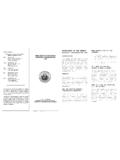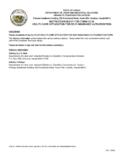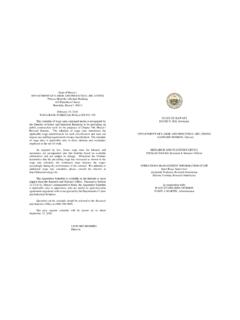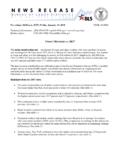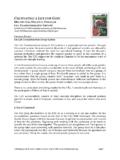Transcription of ADMINISTRATIVE RULES (CHAPTER 10, TITLE 12) …
1 ADMINISTRATIVE RULES . ( chapter 10, TITLE 12). subchapter 1. general provisions . 12-10-1 Definitions. As used in this chapter : "Able to resume work " shall be as defined in section 386-1, HRS. "Appellate board" shall be as defined in section 386-1, HRS. "Adjuster" means an individual, partnership, corporation, or others, who is in the business of adjusting workers' compensation insurance claims for a self-insured employer, insurer, or others. "Attending physician" shall be as defined in section 386-1, HRS. "Compensation" shall be as defined in section 386-1, HRS. "Covered employment" shall be as defined in section 386-1, HRS. "Department" shall be as defined in section 386-1, HRS. "Director" shall be as defined in section 386-1, HRS. "Disability" shall be as defined in section 386-1, HRS. "Disqualified health care provider" means a health care provider barred under section 386-27, HRS, from providing health care services to a person who has suffered a work injury.
2 "Employee" shall be as defined in section 386-1, HRS. "Employee in comparable employment" shall be as defined in section 386-1, HRS. "Employee's designated representative", for the purpose of section 386-31(b)(1), HRS, means the representative of record of the employee, such as the employee's attorney or union representative. As used in this chapter , employee shall include the employee's representative unless clearly indicated otherwise. 1. "Employer", as defined in section 386-1, HRS, includes a self-insured employer or the self-insured employer's adjuster or designated representative unless clearly indicated otherwise, the insurer of an employer, or an employer who has failed to comply with section 386-121, HRS. "Employer's designated representative", for the purpose of section 386-31(b)(1), HRS, shall include: (1) A self-insured employer's adjuster or attorney of record;. (2) An insured employer's insurer, adjuster, or attorney of record; or (3) The adjuster or attorney of record of an uninsured employer.
3 "Employment" shall be as defined in section 386-1, HRS. "Employment for personal, family, or household purposes" includes but is not limited to: (1) Services performed by an individual in constructing, repairing, or maintaining employer's private place of abode or dwelling. (2) Domestic, valet, custodial, or babysitting services performed by an individual for an employer in or about a private place of abode. (3) Chauffeuring or personal safeguarding services performed by an individual for an employer or members of the employer's family. "Full-time student" means an individual who is considered a regular full-time student by the educational institution at which the individual is enrolled or registered. "Hanai child" means a child who, prior to the industrial injury, is taken permanently to reside, be educated, and reared by someone other than the natural parents, traditionally a grandparent or other relative. "Health care provider" shall be as defined in section 386-1, HRS.
4 "Higher wages" means a higher regular rate of pay per unit of time. "Insured employer" means an employer who obtains workers' compensation insurance from an insurer pursuant to section 386-121(a)(1), HRS. 2. "Insurer" means any insurance company authorized by the insurance commissioner to underwrite, sell, or transact workers' compensation insurance in the State of Hawaii. "Medical care", "medical services", or "medical supplies" shall be as defined in section 386-1, HRS. "Medical stabilization" means that no further improvement in the injured employee's work -related condition can reasonably be expected from curative health care or the passage of time. Medical stabilization is also deemed to have occurred when the injured employee refuses to undergo further diagnostic tests or treatment which the health care provider believes will greatly aid in the employee's recovery. "Personal injury" shall be as defined in section 386-1, HRS. "Physician" shall be as defined in section 386-1, HRS.
5 "Self-insured employer" means an employer authorized by the director to comply with chapter 386, HRS, pursuant to section 386-121(a)(2) or (3), HRS. "Sixty-six and two-thirds per cent", as required by sections 386-31 and 386-32, HRS, means the factor .6667. "State average weekly wage" shall be as defined in section 386-1, HRS. "This statute" or "the statute" means chapter 386, HRS, unless otherwise specified. "Total disability" shall be as defined in section 386-1, HRS. "Trade, business, occupation, or profession" shall be as defined in section 386-1, HRS. "Uninsured employer" means an employer who has failed to comply with section 386-121, HRS. "Wages" shall be as defined in section 386-1, HRS. "Week" or "workweek" means a fixed and regularly recurring period of seven consecutive days. " work injury" shall be as defined in section 386-1, HRS. [Eff: 4/30/81; am 12/17/82; am 11/29/85; am 2/28/11] (Auth: HRS 386-27, 386-72) (Imp: HRS 386-1, 3.)
6 386-2, 386-3, 386-21, 386-24, 386-25, 386-27, 386-31, 386-32, 386-42, 386-43, 386-51, 386-71, 386-91, 386-121). 12-10-2 Negotiation for benefit coverage. (a) The collective bargaining agreement shall not deny workers' compensation benefits to any employee who would be eligible for workers' compensation benefits under chapter 386, HRS. (b) The collective bargaining agreement shall not diminish the entitlement of an employee to compensation payments for benefits such as temporary total or partial disability, permanent total or partial disability, vocational rehabilitation, death benefits, funeral and burial benefits, benefit adjustments, or medical treatment fully paid by the employer. (c) Provision for medical care and services and treatment plan and medical fee schedule requirements prescribed under sections 386-21 and 386-26, HRS, and related Hawaii ADMINISTRATIVE RULES may be collectively bargained provided that reasonably needed medical care, services, and supplies, as the nature of the injury requires, are provided.
7 (d) Notwithstanding the medical fees provided by chapter 386 and related Hawaii ADMINISTRATIVE RULES , fees for medical services may be collectively bargained. (e) The special compensation fund established under section 386-151, HRS, and employers not a party to the collective bargaining agreements are not bound by provisions of the agreement. Disagreements involving the special compensation fund and employers not a party to the collective bargaining agreement will be resolved according to provisions under chapter 386, HRS. (f) Employers, groups of employers, and appropriate bargaining units with approved collective bargaining agreements may be required to provide the director with data to assess the effectiveness and efficiency of such agreements. This data may include: (1) Number of employees covered by the agreements;. (2) Number of claims filed;. (3) Average cost per claim;. 4. (4) Names of injured employees subject to collective bargaining agreements; and (5) Other pertinent information.
8 (g) Every employer, group of employers, or bargaining unit proposing to establish any program permitted under section , HRS, shall submit to the director at least ninety calendar days prior to the effective date of the collective bargaining agreement: (1) A certified executed copy of the agreement signed and notarized by all parties;. (2) A listing of all employers subject to provisions of this agreement;. (3) Number of employees covered by the agreement; and (4) Other pertinent information. (h) Additions or deletions of employers subject to the collective bargaining agreement shall be filed with the director at least ten calendar days prior to the effective date of the addition or deletion. (i) Any modifications to the approved collective bargaining agreement must be filed with the director for approval at least ninety calendar days prior to the effective date of the modification. (j) The employer, group of employers, or bargaining unit shall notify the director in writing within ninety calendar days of intent to terminate the approved collective bargaining agreement.
9 The employer, group of employers, or bargaining unit shall notify all employees covered under the collective bargaining agreement of the effective date of termination. The employer, group of employers, or bargaining unit shall also notify all employees with claims pending further action that their claims will be subject to the requirements of chapter 386, HRS, unless otherwise provided in the collective bargaining agreement. (k) No compromise in regard to a claim for compensation covered by an approved collective bargaining agreement shall be valid unless it is approved by decision of the director as conforming to chapter 386, HRS, and made a part of the decision. [Eff: 11/22/97] (Auth: HRS 386-72) (Imp: HRS ). 5. 12-10-3 to 12-10-20 (Reserved). subchapter 2. COMPENSATION. 12-10-21 Disabilities. (a) Impairment rating guides issued by the American Medical Association, American Academy of Orthopedic Surgeons, and any other such guides which the director deems appropriate and proper may be used as a reference or guide in measuring a disability.
10 (b) If an employee is unable to complete a regular daily work shift on account of a work injury, the employee shall be deemed totally disabled for work for that day. [Eff: 4/30/81] (Auth: HRS 386-72) (Imp: HRS 386-31, 386-32, 386-33, 386-34). 12-10-22 Annual proof of dependency. Alien dependents not residing in the United States at the time of the injury or leaving the United States subsequently shall furnish the liable employer annually with a verified document certifying the continuance of dependency on a form prescribed by the director. [Eff: 4/30/81] (Auth: HRS 386-72). (Imp: HRS 386-42). 12-10-23 Computation of average weekly wages. Except as otherwise provided by section 386-51, HRS, an injured employee's average weekly wage shall be computed as follows: (1) If the employee is employed on an hourly basis and has no overtime or other earnings during the one-year period prior to the work injury, the hourly rate shall be multiplied by the number of hours worked in a workweek.

